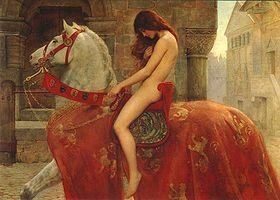
“If you want to connect, you have to allow yourself to be seen.”
- Brené Brown -
“When we were children, we used to think that when we were grown-up we would no longer be vulnerable. But to grow up is to accept vulnerability. To be alive is to be vulnerable.”
The legend of Lady Godiva raises questions about gender relations, about voyeurism and exhibitionism, about vulnerability and empathy, solidarity and activism. At the same time the story illustrates in a poetical way the need to express and the courage to show ourselves as vulnerable human beings.
In Godiva, The joy of playing together the ambiguity of the legend of Lady Godiva is a starting point and inspiration for a collaboration with a group of people with different skills, profiles, artistic and cultural backgrounds. Participants are invited to leave familiar paths. Lady Godiva is the trigger for a game: a dialogue of actions, reactions, interactions. Rules, roles and relationships are established. Which part of ourselves do we (not) want to reveal?
According to the legend, Lady Godiva was an Angelo – Saxon noblewoman from the 11th century. In order to gain a remission on the oppressive taxations imposed by her husband, the duke of Mercia, on the citizens, she rode naked on a horse through the streets of Coventry. She concluded a pact with the citizens of the town: all windows, doors and curtains had to remain closed. The streets of Mercia should be empty and know one would look upon her naked. Only one man, Peeping Tom, couldn't resist. He got punished for his voyeurism by blindness. Impressed by the courage of his wife, Leofric then lowered the taxes.
Godiva: The joy of playing together
'Playing' is a characteristic of the human being. Without intuition, the pleasure to discover and a sense for experiment there is no creation. However, we are often trapped in preconceived ideas, in learned behaviour and cultural habits. We are afraid for criticism and lose the connection with our most precious gift: our vulnerability, the source for beauty and honest connection.
CREDITS:
Concept: Rebecca Lenaerts
Workshops and artistic interventions:
- Primary school De Wimpel Elsene, MUS-E Belgium (2012)
- workspace nadine, Brussels (2012)
- Workshops and masterclasses in the European school Brussels (2013)
- University Nottingham, ALCS Student Days_ Low Countries Studies (2013)
- Platform-K, Ghent (2014)
- Schwelle 7, Berlin (2014)
- EINKLANG 2014, Berlin (2015)
